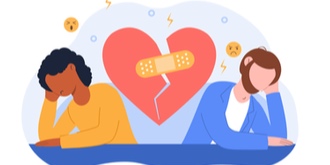
Signs of a negative relationship may vary from person to person, but in general the signs listed below may be an indicator of a negative relationship:
Constant Conflict: If the relationship is constantly filled with conflict, fights and disagreements, this is a negative sign.
Communication Problems: If clear communication is lacking or there are communication problems that constantly cause misunderstandings, your relationship can be negatively affected.
Disrespectful Behavior: If your partner disrespects you, insults you, or belittles you, this is a negative sign.
Insecurity: Feelings of insecurity, constant doubts, and an inability to trust your partner can indicate that the relationship is not healthy.
One-Sided Effort: If one party constantly strives to maintain the relationship while the other party is indifferent to this issue, this may upset the balance.
Indifference: If your partner is unwilling to understand or care for you, it may suggest that the relationship is going in a negative direction.
Manipulation: One party trying to manipulate or emotionally blackmail the other is a negative factor for a healthy relationship.
Irrelevant Sexual Life: Problems in sexual life can create distance between partners and have a negative impact.
Incompatibility in Shared Values: Incompatibility in core values or goals can cause problems for a long-term relationship.
Constant Sadness or Stress: If the relationship has become a constant source of sadness, stress, or unhappiness, this may be a sign of a negative relationship.
Ways to get out of or improve a negative relationship may include strengthening communication between couples, understanding emotional needs, talking openly about problems, and seeking professional help when necessary. Couples therapy is an effective type of therapy used to address problems between couples, strengthen communication and improve the relationship. However, couples therapy does not always produce positive results and can sometimes contribute to a negative relationship. Here are the situations that may cause negative consequences during couples therapy:
Reluctance: If one or both partners are unwilling to engage in therapy or unwilling to make real change, the effect of therapy may be limited.
Defense Mechanisms: If one or both partners actively use defense mechanisms during therapy, real and in-depth communication cannot be achieved.
Selection of Professional: If the therapist is incompatible with the couple or does not choose a therapist that suits the couple's needs, therapy may have negative results.
Couple's Expectations: If the couple expects a miraculous solution from therapy and has unrealistic expectations, it is difficult for therapy to be successful.
Hidden Problems: If there are basic communication problems between couples and these problems cannot be resolved in therapy, therapy may result negatively.
Hidden Problems: If the couple has underlying problems that they do not share in therapy or are unaware of, this may prevent therapy from being effective.
Time Factor: Time, effort and patience are required for therapy to be successful. Expecting quick results may reduce the effectiveness of therapy.
Lack of Training and Experience: If the therapist does not have sufficient training and experience, it may cause difficulty in understanding the couple's needs.
If a negative couples therapy experience is experienced, it is important for couples to communicate openly with their therapists about this issue and seek another therapist when necessary. Honesty and cooperation in therapy can contribute to positive outcomes.
